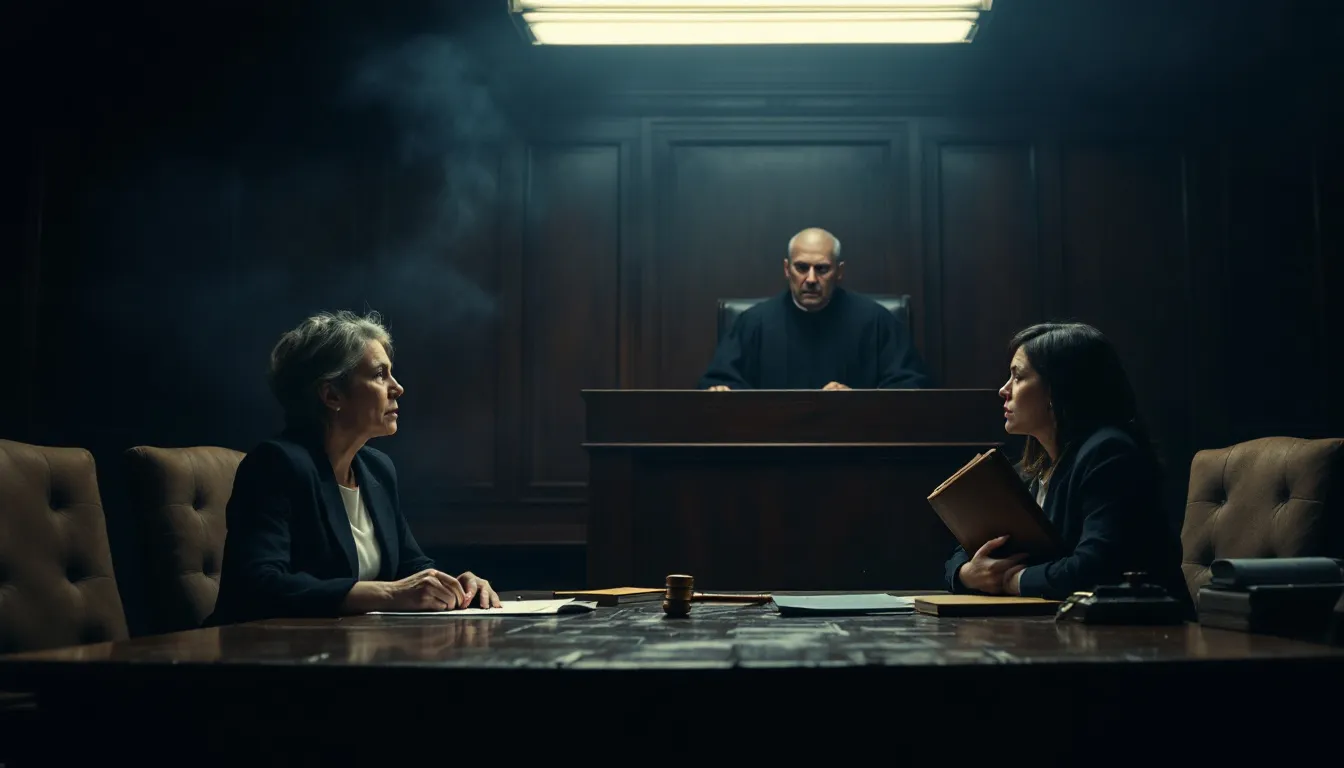
You’re standing by the door, checking the clock—again. Your ex was supposed to return your child by 6 p.m., but it’s now 7, and there’s no sign of them. In Texas, that little “mix-up” could lead to Texas Criminal Charges Interference with Custody—yes, that’s a real felony charge, and yes, it can happen faster than you’d think.
Texas Criminal Charges Interference with Custody isn’t just legal jargon—it’s a serious accusation that can wreck your custody rights and land you in hot water with the law. Whether you’re a well-meaning parent running late or someone dealing with an uncooperative ex, one wrong move can turn into a criminal case.
Short answer? Yes—violating a custody order in Texas can lead to felony charges, and the consequences don’t stop at jail time.
They can impact your custody arrangement, your criminal record, and even your future parenting time.
In this article, we’ll unpack exactly what counts as interference, who can be charged, and how it all plays out in real life. From emergency orders to tech-based evidence, false allegations to CPS involvement—we’re covering every angle. Stick around. You might just save yourself from making a life-altering mistake.
Key Takeaways
- Interference with child custody in Texas is classified as a state jail felony, with serious legal repercussions for violating custody agreements.
- Actions such as unlawfully withholding a child, failing to return them after visitation, or relocating them without permission can lead to criminal charges for custody interference.
- Consulting a family law attorney is crucial for navigating custody disputes, understanding legal rights, and developing a defense strategy against custody interference charges.
Defining Custody Interference Under Texas Law
In Texas, Texas Criminal Charges Interference with Custody can occur when a parent or another individual knowingly violates a valid court-ordered custody arrangement. This includes taking, keeping, or hiding a child in a way that disrupts the other parent’s court-ordered possession or access. According to Texas Penal Code § 25.03, this offense is classified as a state jail felony, highlighting the seriousness of custody violations—even when they seem minor.
The law applies to more than just noncustodial parents refusing to return a child after visitation. It also includes actions like relocating a child without consent or keeping a child beyond the allowed period, even during holidays or summer breaks. Furthermore, Texas Family Code § 157.371 allows courts to enforce custody orders through civil remedies in addition to criminal prosecution, offering affected parents multiple avenues for relief.
At the Law Office of Bryan Fagan, PLLC, we understand how emotionally charged custody disputes can be—and how quickly they can escalate into legal action. If you’re facing or considering legal steps related to Texas CriminalCharges Interference with Custody, don’t go it alone. Learn more by visiting our blog: Interference with Child Custody as an Enforcement Tool, or contact our team for experienced legal guidance.

Legal Custody vs. Physical Possession
Legal custody refers to the right to make significant decisions about a child’s welfare, such as education, healthcare, and religious upbringing. Physical possession, on the other hand, pertains to where the child lives on a day-to-day basis. Both aspects are critical in defining the boundaries of a child’s custody agreement.
Distinguishing between these two forms of custody is vital. Legal custody involves decision-making authority, while physical possession concerns the child’s residence. Violating either aspect can result in serious legal consequences under Texas law.
Actions Leading to Custody Interference Charges
At the Law Office of Bryan Fagan, PLLC, we frequently counsel clients dealing with the serious legal consequences of custody violations. Texas Criminal Charges Interference with Custody can arise in many forms, most commonly when a noncustodial parent encourages or coerces a child to leave the custodial parent in violation of a court order. Under Texas Penal Code § 25.03, such conduct is considered a state jail felony, and even seemingly small acts—like interfering during an exchange or denying possession—can have major legal repercussions.
These charges aren’t limited to dramatic abduction scenarios. They can also result from failing to return a child after visitation, relocating a child out of state without proper consent, or intentionally withholding the child during the other parent’s scheduled time. Even canceling court-ordered visitation without a valid reason may trigger enforcement or criminal proceedings. Texas Family Code § 157.371 supports enforcement of visitation and possession orders, providing courts with authority to impose both civil and criminal penalties for violations.
If you suspect your ex-spouse has interfered with your parental rights, or if you’re being accused of doing so, swift legal action is crucial. For a deeper look into your options and what steps to take next, visit our blog post: Help! My Ex-Spouse Kidnapped My Child. Texas Criminal Charges Interference with Custody is a complex issue—but with the right legal guidance, you can protect your parental rights and your child’s well-being.

Taking or Keeping a Child Without Legal Right
Taking a child without proper legal authority is a criminal offense in Texas. A noncustodial parent commits interference by knowingly taking a child from the custodial parent against court orders, clearly violating the custody order and facing serious legal consequences.
Defendants might argue that they returned the child to the proper judicial district within three days as a defense in district court. However, knowing the specifics of your legal rights and the exact terms of the custody order is crucial in such situations involving a statutory county court.
Failing to Return a Child After Visitation
Failing to return a child after visitation, as outlined in Texas Penal Code § 25.03, can result in serious legal repercussions, including felony charges. Not returning a child after visitation can lead to criminal prosecution for custody interference.
A common scenario involves a parent taking a child during a visitation period and not returning them as outlined in a court order. This not only disrupts the child’s custody but also violates the express terms of the custody agreement.
Hiding or Relocating a Child
At the Law Office of Bryan Fagan, PLLC, we often work with parents navigating complex interstate custody disputes—many of which involve serious legal risks. Texas Criminal Charges Interference with Custody may apply when a parent relocates or hides a child outside of Texas without proper court authorization. Under Texas Penal Code § 25.03, taking a child out of state in violation of a custody order is classified as a state jail felony, even if the parent believes the move is in the child’s best interest.
According to Texas Family Code § 153.001 and § 153.133, court orders typically include geographic restrictions designed to maintain the child’s stability and relationship with both parents. Relocating a child across state lines without written agreement or court approval disrupts this balance and may lead to not only criminal charges, but also a modification of custody in favor of the other parent.
For parents involved in out-of-state custody disputes, understanding your legal rights and boundaries is essential. Before making a move—or if your co-parent has already done so—visit our resource: Child Custody Across State Lines. Our team is here to help you respond effectively and lawfully when Texas Criminal Charges Interference with Custody becomes a factor.

Criminal vs. Civil Consequences
In Texas, custody interference is primarily treated as a criminal offense, leading to prosecution by the state. This differs from civil cases, which are typically initiated by the affected parent and focus on resolving disputes rather than punishing the alleged offender.
Violating custody orders can lead to criminal prosecution with serious long-term repercussions, including potential imprisonment and monetary fines. Custodial interference, categorized as a state jail felony punishable, can result in incarceration and substantial fines.
In civil cases, actions may result in changes to custody arrangements or visitation rights. However, a civil suit regarding criminal charges imposes more severe penalties and legal consequences, underscoring the importance of adhering to child custody orders.
Potential Penalties for Custody Interference
At the Law Office of Bryan Fagan, PLLC, we know how high the stakes can be when a custody order is violated. Texas Criminal Charges Interference with Custody is a serious offense that can lead to criminal and civil consequences for any parent who intentionally disrupts a court-ordered custody or visitation schedule. Under Texas Penal Code § 25.03, this offense is classified as a state jail felony, punishable by up to two years in jail and fines of up to $10,000.
But the consequences don’t stop at criminal penalties. A conviction for custody interference can have a lasting impact on your parental rights, including your ability to modify or maintain visitation and conservatorship. Courts may consider such behavior when determining the best interest of the child under Texas Family Code § 153.002, potentially resulting in reduced access or changes to your existing custody order.
If you’re concerned that your rights have been violated—or you’re facing accusations of interference—our team is here to help you understand your legal position. To explore how wrongful interference can affect more than just custody, check out our blog: Can I Sue Another Woman for Destroying My Marriage?. Whether you’re dealing with a high-conflict co-parent or fighting to protect your time with your child, we can guide you through the complexities of TexasCriminal Charges Interference with Custody.

Law Enforcement Response to Custody Interference
At the Law Office of Bryan Fagan, PLLC, we understand how stressful it can be when custody orders are violated. In cases involving TexasCriminal Charges Interference with Custody, law enforcement plays a critical role in ensuring compliance with court-ordered terms. When officers respond to a custody-related call, they typically request to see the existing court order to determine each parent’s legal rights and obligations. This step is essential, as outlined in Texas Family Code § 157.001, which governs enforcement of possession and access provisions.
Even if law enforcement doesn’t immediately take action—such as arresting the interfering parent—they will often file a written report documenting the incident. This report becomes important evidence in both civil and criminal proceedings. It can support an enforcement motion under Texas Family Code § 157.002 or lead to criminal prosecution under Texas Penal Code § 25.03, depending on the nature and severity of the violation.
If you believe your custody rights have been violated or if you’re facing a police report related to alleged interference, acting quickly is key. Our attorneys can help you respond appropriately and protect your rights under Texas law. For more insight into how child abduction and interference are handled by Texas law enforcement, read our detailed guide: Child Abduction in Texas: An Overview of Relevant Laws. We’re here to support you in navigating the legal risks tied to Texas Criminal Charges Interference with Custody.

Steps to Take If Your Custody Order Is Violated
If your custody order has been violated, document any incidents, noting dates, times, and specific details. Open communication with your ex-spouse may help resolve misunderstandings before escalating to legal measures.
Consulting a lawyer promptly can clarify your options, including filing a contempt motion for ongoing violations. A skilled family law attorney can significantly aid in understanding custody disputes and navigating complex legal processes.
In severe cases, seeking emergency custody may be necessary to protect the child’s immediate safety. Consulting an attorney can increase the likelihood of achieving a favorable outcome in custody interference cases.
Legal Defenses Against Custody Interference Charges
An affirmative defense can be established if the child was retained due to uncontrollable circumstances with timely notice to the other party. Parents may also argue that their actions were justified by an emergency situation.
Claims of compliance with valid custody orders can serve as a potential defense against custody interference charges. A legal defense strategy is crucial for anyone facing such charges to protect their rights and ensure lawful custody.
Real-Life Examples and Hypothetical Scenarios
Custodial interference is not limited to parents; other relatives, such as grandparents, can also be charged if they violate custody or visitation orders. For instance, a grandparent taking a child out of state without permission can face similar charges to a noncustodial parent.
A hypothetical scenario might involve a parent taking their child out of state for an unplanned vacation without informing the other parent or getting court approval. Such an action can lead to felony charges for custody interference, emphasizing the importance of adhering to custody agreements.
Importance of Consulting a Family Law Attorney
Consulting a family law attorney is essential for individuals facing custody interference or reporting such incidents. A knowledgeable attorney can provide guidance, gather necessary documentation, and immediately retain legal counsel to represent you in court.
Resources such as TXAccess court forms and documents can assist with family law paperwork, but the expertise of a family law attorney is invaluable. Matthew Horak specializes in crimes against the family, including custody violations.

Conclusion:
If you’ve made it this far, one thing should be crystal clear: Texas Criminal Charges Interference with Custody is no joke. What might feel like a minor decision—keeping your child an extra night or refusing a scheduled visit—can quickly spiral into felony territory.
Custody orders aren’t suggestions; they’re binding legal documents backed by serious consequences. Even with the best intentions, crossing the line can cost you custody, your reputation, and even your freedom.
So whether you’re a parent feeling wronged or one worried about making the wrong move, knowledge is your best defense. Understanding what the law says—and how it’s enforced—can keep you from turning a tense situation into a full-blown legal crisis.
At the end of the day, it’s not just about avoiding charges. It’s about protecting your relationship with your child and navigating custody with clarity, confidence, and care.
When in doubt, don’t guess. Call an experienced Texas family law attorney and make sure your next move is the right one—not the regrettable one.





